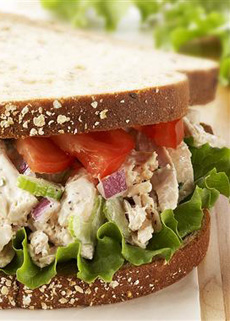TIP OF THE DAY: Eat More Walnuts & Other Unprocessed Foods
|
You can add walnuts to almost any recipe: |
Tiny changes in your diet can reap big results. Take walnuts, which provide energy, protein and other good nutrition. They can help prevent heart disease, cancer and other conditions, tasting delicious in the process.
Walnuts are heart healthy.* They’re one of the most nutrient-dense food sources of alpha-linolenic acid (ALA), an essential omega-3 fatty acid that fights bone breakdown in aging adults—and also decreases insulin resistance, assists with weight management and may be beneficial in brain function. The journal Nutrition and Cancer has just published a new study indicating that walnuts may reduce breast cancer as well (October is Breast Cancer Awareness Month). A study of cancer in mice, funded by the American Institute of Cancer Research and the California Walnut Commission (neither of which had any input on the study design or findings), showed that the risk of breast cancer dropped up to 50% when the mice’s daily diet included a modest amount of walnuts. In the 50% reduction group, walnuts were added to the diets of the mothers, from conception through weaning, and into the diet of their offspring from birth. |
|
|
What has already been established by science is that if we eat more unprocessed, fiber-filled foods—nuts, vegetables, fruits, whole grains and beans—we can improve our overall health and reduce the risk of cancer and other chronic diseases. Little adjustments in diet can have big payoffs down the road. While an animal study is a precursor toward testing in humans, the new study is an indication of how walnuts might play a role in preventing cancer. EASY WAYS TO ADD WALNUTS TO YOUR DIET The amount of walnuts in the test diet equates to 2 ounces a day for humans. It’s easy to include halved, chopped or ground walnuts to every meal. In addition to long-term health benefits, they add flavor, crunch and nutritional punch. Walnuts At Breakfast |
||


